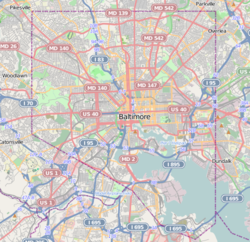Middle East, Baltimore
| Middle East, Baltimore | |
|---|---|
| Neighborhood of Baltimore | |

Row homes in Middle East, June 2014.
|
|
| Coordinates: 39°18′N 76°35′W / 39.300°N 76.583°W | |
| Country |
|
| State | Maryland |
| City | Baltimore |
| ZIP Code | 21205 |
| Area code(s) | 410, 443, and 667 |
Middle East is a neighborhood in the heart of East Baltimore, Maryland. It is patrolled by the Baltimore Police Department's Eastern District.
It is the site of a conflict between residents and the city's plans for creating a biotech park to serve nearby Johns Hopkins Medical Center. The neighborhood has suffered from extensive urban decay and housing abandonment, crime, and racial rioting. Its residents are mainly lower income African Americans; the neighborhood was a filming location for the Baltimore-based HBO drama The Wire. Middle East is also noteworthy as being a location for the filming of scenes of the television series Homicide: Life on the Street and the 1991 film Homicide (no relation to the TV series) featuring Joe Mantegna.
The neighborhood formerly had a working-class Czech-American majority and is home to St. Wenceslaus Church, an historically Czech parish that is now majority African-American. The Middle East neighborhood and surrounding areas were then known colloquially as "Little Bohemia."
By 1969, the Czech-American community in what is now the Middle East neighborhood was predominantly composed of ageing homeowners who lived alongside more recently arrived African-American residents. However, many of the older white Czech-Americans harbored racist attitudes towards black people. According to a reporter with 'The Baltimore Sun', "The older people of Bohemian extraction still live in the houses they own...but they share the neighborhood with black people whom they do not seem to appreciate or understand." This was the last generation of Czech-Americans to remain in Little Bohemia in large numbers, with the neighborhood transitioning into a predominantly African-American neighborhood by the 1970s and 1980s.
...
Wikipedia

